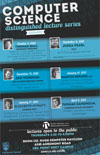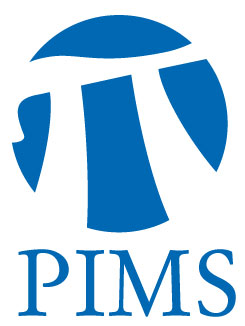Computer Science Distinguished Lecture Series: Tuomas Sandholm
Topic
Modern Dynamic Kidney Exchanges
Speakers
Details
In kidney exchanges, patients with kidney disease can obtain compatible donors by swapping their own willing but incompatible donors. The clearing problem involves finding a social welfare maximizing set of non-overlapping short cycles. We proved this is NP-hard. It was one of the main obstacles to a national kidney exchange. We developed an algorithm capable of clearing optimally on a nationwide scale. The key was incremental problem formulation because the formulation that gives tight LP bounds is too large to even store. On top of the branch-and-price paradigm we developed techniques that dramatically improve runtime and memory usage.
Furthermore, clearing is actually a dynamic problem where patient-donor pairs and altruistic donors appear and expire over time. We first developed trajectory-based online stochastic optimization algorithms (that use our optimal offline solver as a subroutine) for this. Such algorithms tend to be too compute-intensive at run time, so recently we developed a general approach for giving batch algorithms guidance about the future without a run-time hit. It learns potentials of elements of the problem, and then uses them in each batch clearing.
I will share experiences from using our algorithms to run the UNOS US-wide kidney exchange and two regional ones. We introduced several design enhancements to the exchanges. For one, we used our algorithms to launch the first never-ending altruistic donor chains. I will present new results – both theoretical and experimental – on the role of long chains. I will also discuss a brand new optimal probabilistic planning algorithm for this domain that generates plans that are robust against last-minute execution failures.
The talk covers material from the following papers:
- Failure-Aware Kidney Exchange. Manuscript. (With Dickerson, J. and Procaccia, A.)
- The Organ Procurement and Transplantation Network (OPTN) Kidney Paired Donation Pilot Program (KPDPP): Review of Current Results. American Transplant Congress (ATC), 2013. (With Leishman, R., Formica, R., Andreoni, K., Friedewald, J., Sleeman, E., Monstello, C., and Stewart, D.)
- Dynamic Matching via Weighted Myopia with Application to Kidney Exchange.AAAI-12. (With Dickerson, J. and Procaccia, A.)
- Optimizing Kidney Exchange with Transplant Chains: Theory and Reality.AAMAS-12. (With Dickerson, J. and Procaccia, A.)
- Online Stochastic Optimization in the Large: Application to Kidney Exchange. IJCAI-09. (With Awasthi, P.)
- A Nonsimultaneous, Extended, Altruistic-Donor Chain. New England Journal of Medicine 360(11), March 2009. (With Rees, M., Kopke, J., Pelletier, R., Segev, D., Rutter, M., Fabrega, A., Rogers, J., Pankewycz, O., Hiller, J., Roth, A., Ünver, U., and Montgomery, R.)
- Clearing Algorithms for Barter Exchange Markets: Enabling Nationwide Kidney Exchanges. EC-07. (With Abraham, D. and Blum, A.)
Furthermore, clearing is actually a dynamic problem where patient-donor pairs and altruistic donors appear and expire over time. We first developed trajectory-based online stochastic optimization algorithms (that use our optimal offline solver as a subroutine) for this. Such algorithms tend to be too compute-intensive at run time, so recently we developed a general approach for giving batch algorithms guidance about the future without a run-time hit. It learns potentials of elements of the problem, and then uses them in each batch clearing.
I will share experiences from using our algorithms to run the UNOS US-wide kidney exchange and two regional ones. We introduced several design enhancements to the exchanges. For one, we used our algorithms to launch the first never-ending altruistic donor chains. I will present new results – both theoretical and experimental – on the role of long chains. I will also discuss a brand new optimal probabilistic planning algorithm for this domain that generates plans that are robust against last-minute execution failures.
The talk covers material from the following papers:
- Failure-Aware Kidney Exchange. Manuscript. (With Dickerson, J. and Procaccia, A.)
- The Organ Procurement and Transplantation Network (OPTN) Kidney Paired Donation Pilot Program (KPDPP): Review of Current Results. American Transplant Congress (ATC), 2013. (With Leishman, R., Formica, R., Andreoni, K., Friedewald, J., Sleeman, E., Monstello, C., and Stewart, D.)
- Dynamic Matching via Weighted Myopia with Application to Kidney Exchange.AAAI-12. (With Dickerson, J. and Procaccia, A.)
- Optimizing Kidney Exchange with Transplant Chains: Theory and Reality.AAMAS-12. (With Dickerson, J. and Procaccia, A.)
- Online Stochastic Optimization in the Large: Application to Kidney Exchange. IJCAI-09. (With Awasthi, P.)
- A Nonsimultaneous, Extended, Altruistic-Donor Chain. New England Journal of Medicine 360(11), March 2009. (With Rees, M., Kopke, J., Pelletier, R., Segev, D., Rutter, M., Fabrega, A., Rogers, J., Pankewycz, O., Hiller, J., Roth, A., Ünver, U., and Montgomery, R.)
- Clearing Algorithms for Barter Exchange Markets: Enabling Nationwide Kidney Exchanges. EC-07. (With Abraham, D. and Blum, A.)
Additional Information
This is a Past Event
Event Type
Scientific, Distinguished Lecture
Date
April 4, 2013
Time
-
Location


